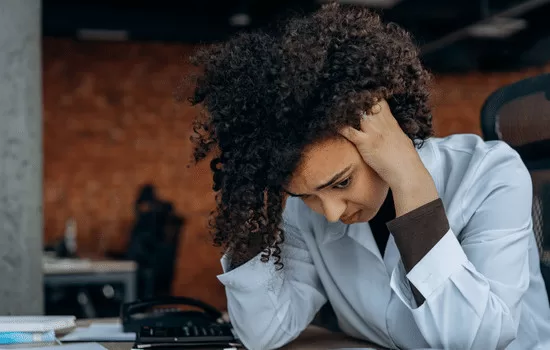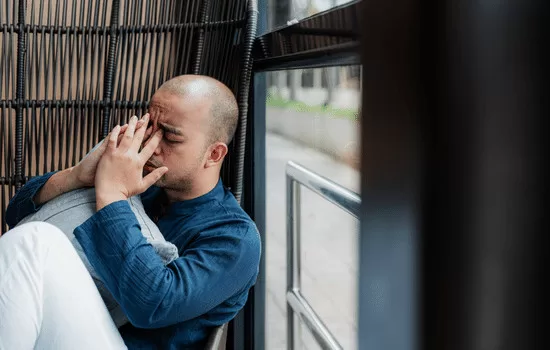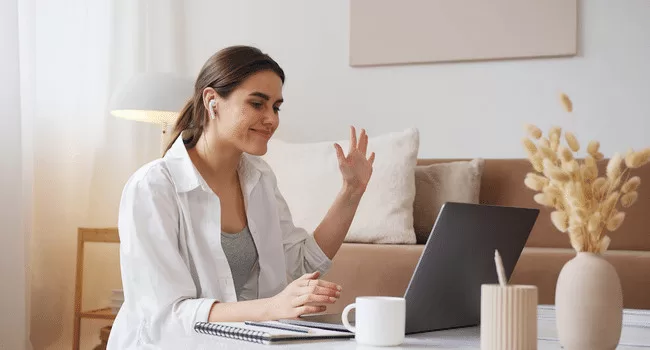Takeaway: Occasional anxiety is (unfortunately) part of the human experience. However, it can get out of hand and start to have a drastic impact on your day to day life. Here are some common indicators that can tell you when to see a therapist for anxiety.

What is anxiety?
Everyone feels anxious from time to time. Our anxiety exists for a reason: to keep us safe from potential threats. For example, if you were in the woods and saw a wild animal running toward you, your anxiety response would instinctively kick in and mobilize you to fight off the threat or run away.
In our modern world, we don’t often encounter immediate threats to our safety. Anxiety may have kept our early ancestors safe, but nowadays, that response can be triggered by situations that aren’t life or death.
Of course, there are plenty of times when it makes sense to feel anxious. If you have a big presentation at work or momentarily lose sight of your child, your anxiety response is completely warranted. However, constant worry can be a sign that your mental health is suffering.
Types of anxiety disorders
If your anxiety seems to go above and beyond what you’d expect, or it has a significant impact on your mental health or other areas of your life, you may have an anxiety disorder. While only a mental health professional can diagnose anxiety disorders or other mental health issues, there are some anxiety symptoms to be aware of.
Generalized anxiety disorder
As the name suggests, people with generalized anxiety disorder (GAD) often have a broad sense of anxiety most of the time. This kind of anxiety is not tied to a particular stressful event, but rather exists as a widespread feeling of worry.
While each person’s experience of generalized anxiety is different, some common symptoms include difficulty controlling worry, trouble concentrating, sleep issues, difficulty relaxing, and muscle tension.
Social anxiety disorder
Unlike those with GAD, people with social anxiety disorder have a specific social phobia rather than an overarching feeling of worry. People with this disorder experience anxious feelings in social settings, often worrying about judgment from others.
Social anxiety goes beyond feeling a little nervous before being in a group of people. Those with social phobia may avoid certain situations because the feelings of anxiety are so intense. This can have a significant impact on a person’s quality of life.
Panic disorder
This disorder can occur on its own or alongside other anxiety disorders. People with panic disorder experience panic attacks, which are episodes of intense fear. Panic attacks come on out of nowhere without a specific trigger or cause.
Alongside feeling fearful or out of control, panic attacks also have powerful physical symptoms such as racing heartbeat, rapid breathing, sweating, shaking, and feeling lightheaded.

Should I see a therapist for anxiety?
It’s up to each individual to determine if they should see a counselor for anxiety. Reaching out for help can be difficult, especially if you are new to therapy. However, there is no shame in getting support. Mental health professionals are trained to treat anxiety disorders and can help you cope with your symptoms and overall health and wellbeing.
5 signs you should see a counselor for anxiety
While everyone’s mental health journey is different, there are some common indicators that you could benefit from working with a mental health provider. Here are just a few.
- Your physical health has taken a toll
As we described above (and as you may likely know firsthand), anxiety disorders come with a litany of physical health symptoms. Sleep issues, appetite changes, digestive issues, pounding heartbeat, muscle tension, and headaches are just a few of the health problems that are associated with anxiety.
These physical symptoms can take a toll after a while. Talk therapy can help you learn new skills to manage anxiety, including the physical health issues that come alongside it. For example, your therapist may teach you relaxation techniques that can help you release your tense muscles.
- Your relationships are impacted
Anxiety disorders can have a significant effect on your relationships. Social anxiety may prevent you from meeting new people. Generalized anxiety disorder may make it difficult to enjoy spending time with loved ones if you’re wrapped up in worry.
Working with a mental health provider can help you gain insight about how your anxiety symptoms influence your connections with others. By having an awareness of these patterns, you can make meaningful changes to have the relationships you want.
- Your mind is constantly racing
Racing thoughts, difficulty concentrating, and trouble relaxing are all signs of an anxiety disorder. These symptoms can interfere with your ability to complete tasks, feel rested, and generally enjoy life.
When treating anxiety disorders, mental health providers will teach you skills to help you to calm your busy mind and stay grounded in the present moment.
- You avoid people, places, or situations because of your anxiety
People with anxiety disorders often avoid things that make them anxious. This is totally understandable-after all, why would you put yourself in a situation that causes intense emotions and discomfort?
However, this only causes anxious thoughts to intensify over time. Therapy can help you confront your triggers in a structured, supported way.
- You can’t pinpoint something specific that’s stressing you out
While we encourage you to try therapy at any point, feeling stressed or anxious from time to time doesn’t necessarily mean that you need to seek professional help. It’s natural to feel worried about objectively stressful situations.
Anxiety disorders are different from typical stress because they often exist without specific triggers or stressors. Cognitive behavioral therapy (CBT) and other forms of therapy can help you gain awareness over your symptoms and learn how to manage them.
How to talk to a therapist about anxiety
If you have anxiety, it’s natural that you might feel worried about talking to a therapist about your anxiety itself. It can feel overwhelming at first, especially if you’re used to avoiding talking about your feelings as an attempt to avoid the feelings themselves.
Letting your therapist know that you’re feeling anxious in session can help you get the support you need. Your counselor can lead you through a relaxation exercise, support you in taking some deep breaths to ground yourself, or ask questions to help you understand your anxious thoughts.
Remember that your therapist is trained to help guide people through anxiety. It’s your therapist’s job to create a supportive, nonjudgmental environment in session where you feel seen and supported.

Connect With Experienced Anxiety Therapists
At Introspection Counseling Center, we offer online anxiety therapy for residents of North Carolina, New Jersey, and Delaware. We support people like you in unlearning patterns of overthinking and perfectionism that can often go hand in hand with anxiety disorders.
We’re passionate about helping people with anxiety and other mental health conditions break free from the thoughts and behavioral patterns that hold them back. Together, we can empower you to achieve your goals and create the life you truly want.
If you’re curious to learn more about our approach to therapy, we encourage you to reach out and schedule your free 15 minute consultation. During your consultation, we will address your questions and concerns, and we can get a sense of whether we might be a good fit for each other.
We look forward to connecting with you and supporting you on your mental health journey!




